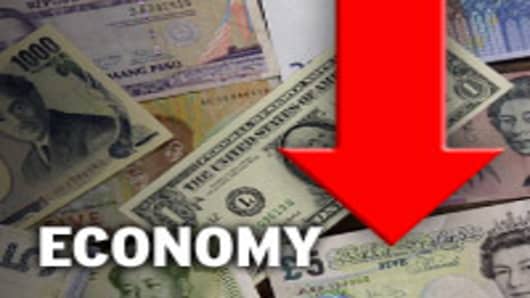“The worst is still very much ahead of us,” economist and professor Nouriel Roubini told CNBC.Click here to watch his interview
Though Roubini has been pushing his doom-and-gloom forecast for a couple years now—and recent developments have made him look particularly prescient—few economists are quite as dour.
To be sure, none are the least bit optimistic. It’s now generally accepted the economy contracted in the third quarter, despite the government’s massive stimulus package, and will continue to do so through the first or second quarters of 2009.
If so, it will be the first time GDP shrank for three consecutive quarters since the 1974-75 period, which also happens to be the last time the economy didn’t grow for two years in a row.
Others say the recession started earlier, thanks partly to the housing collapse and the common recessionary trigger of an oil spike (this time to $100 a barrel and above.)
“You date the recession all the way back to December 2007 because that's when the slip began," says Robert Brusca, chief economist at Fact And Opinion Economics.
If so, this recession will be one of the longest in modern times. The question is how nasty.
Few expect the jobless rate to break double digits as it did in 1982-1983, nor are they expecting the jump in the number of unemployed seen in the 1973-1976 period.
Most expect the jobless rate to break 7 percent in early 2009 and peak at about 8 percent later in the year. Right now, the rate is 6.1 percent. Meanwhile, the number of jobless is up only 40 percent from its October 2007 low, but it could rival the two-thirds level of the 1980-1983 and 2000-2003 periods.
Another question is how much the economy will actually contract. Economists say it will be worse than the two 0.5-percent declines of the 2000- 2001 recession, but probably not match the 3-percent decline of one quarter during the 1990-1991 one. In the 1980-1982 period, GDP declined by more than 3 percent in four separate quarters.
“If we don’t get a good stimulus, we will see a GDP decline of 1 percent, quite likely more,” says Dean Baker of the Center for Economic Policy Research.
Baker says a lot depends on the government’s policy response. The $168 billion-stimulus package of February 2008 cushioned or forestalled the economic slowdown, but is widely considered to have had no lasting impact.
Another stimulus package is now being widely discussed. Experts say it will need to need to emphasize spending and investment—even address housing—rather than feature one-time tax rebates, as the last one did.
That—and some say more interest rate cuts—will soften the recession, if not shorten it.
The interest rate factor, however, is one of several key differences that economists cite.
Baker says previous recessions were essentially caused by interest rate hikes, which is not the case this time.
“We knew how to get out of it,” he says. “Everyone goes out and buys a car and/or a house and jump-starts the economy.”
He doesn’t expect that to happen, partly because the credit crunchmeans “the underlying problems in the economy this time are worse.”
There’s another wild card this time out, based on the convergence of demographics and history.
David Resler, chief economist at Nomura International, estimates that a quarter of the current workforce has never seen a recession. Half have experienced one, but not a deep one.
“It’s going to be a new experience for a lot of people and how severe it turns out is going to shape their attitudes going forward,” says Resler.



